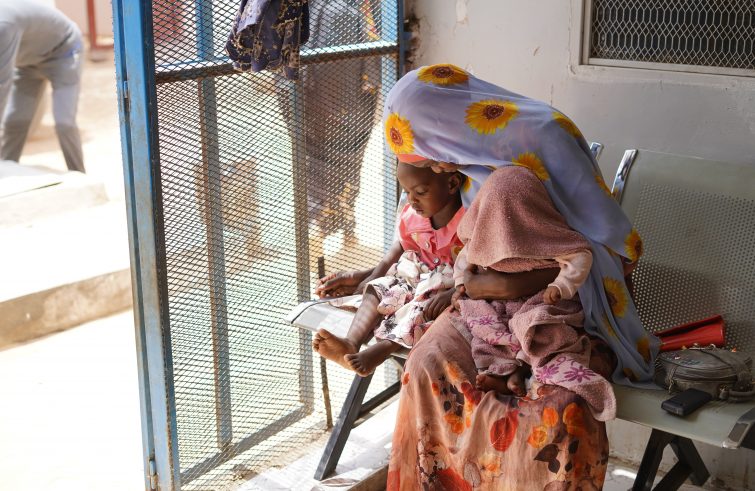
Two months have already passed since fighting in Sudan began – on April 15 2023, in Khartoum – between the Sudanese Armed Forces led by Gen. Abdel Fattah al-Burhan, and Gen. Mohamed Hamdan Dagalo, widely known as Hemeti, who leads the paramilitary Rapid Support Forces (RSF). A dozen ceasefires were proclaimed, but were never respected. After the evacuation of Western nationals, some 2.2 million people fled their homes, according to reports from the International Organisation for Migration (IOM). Of these, some 1.67 million are internally displaced, while another 528,000 people, including refugees, asylum seekers and repatriates, have crossed into neighbouring countries (UNHCR data) including Chad, South Sudan, Egypt and Ethiopia. The victims are once again civilians: according to the IOM, an estimated 1,800 people have died. The conflict has since escalated towards other cities and regions, including Darfur, and is taking on an ethnic dimension. Airstrikes were launched also on El-Obeid town in North Kordofan, 350 kilometres south of Khartoum. The bishop of El Obeid, Msgr. Yunan Tombe Trille Kuku Andali, has chosen to remain next to the people. But the situation he depicted in the local press is dramatic. People are killed in crossfire from the warring parties and humanitarian aid is hardly arriving: there is no food, no drinking water, no medicines, no electricity, and communications services are down. The situation was discussed on April 14 in Rome at the meeting ‘Sudan Emergency: supporting the victims of fighting from Khartoum to Darfur’, moderated by journalist Vincenzo Giardina and organised by Dire news agency, together with the news outlet Report Difesa.
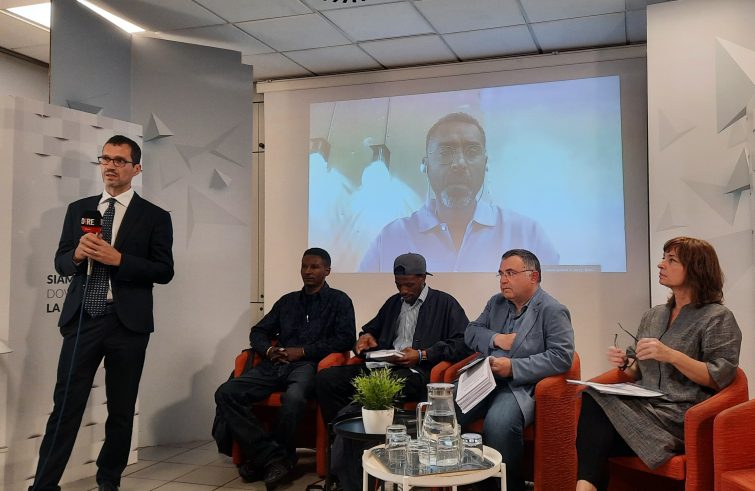
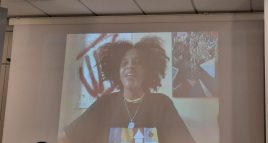 Activist Duaa Tariq spoke via video link from Khartoum. She described her daily life, shrouded by the constant sound of artillery and anti-aircraft gunfire. She lives in Jeraif district, on the banks of the Blue Nile, which is controlled by the Rapid Support Forces (RSF) but close to an army base. Along with other volunteers, she is at the forefront of relief efforts, distributing food, medicine and aid to families still living in the area. They set up
Activist Duaa Tariq spoke via video link from Khartoum. She described her daily life, shrouded by the constant sound of artillery and anti-aircraft gunfire. She lives in Jeraif district, on the banks of the Blue Nile, which is controlled by the Rapid Support Forces (RSF) but close to an army base. Along with other volunteers, she is at the forefront of relief efforts, distributing food, medicine and aid to families still living in the area. They set up
Emergency Rooms to help the local population
and are even assuming government responsibilities, with a centralised coordinating body covering the whole of Sudan’s large three-city capital. Many were members of the ‘resistance committees’ that promoted the 2019 street protests that led to the ousting of former president Omar Al-Bashir, who is on trial at the ICC for crimes committed in Darfur. “This conflict – said Duaa Tariq – follows four years of sustained uprising against the military regime, demanding democratic governance. We are still waiting for humanitarian aid to arrive – she says – we have received very little so far and we’re trying to set up a crowdfunding campaign. We need all the support we can get right now, but we expect the international community’s aid to be decolonised. We expect to be treated as equals, not as victims.
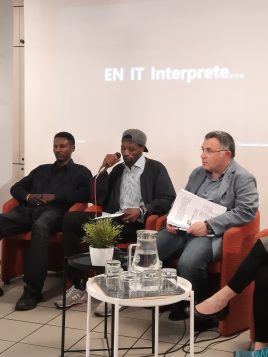 The situation in the town of El Geneina in West Darfur, 1400 km west of Khartoum, is catastrophic. After heavy fighting, it is now under army control. Here, the conflict between the two military factions took on an ethnic dimension, with fighting between the Masalit and Arab tribes. Reportedly, RSF militiamen are committing an ethnic cleansing operation, targeting non-Arab populations. The Sudanese community spokesman in Italy, Adam Nor, who arrived in Italy from Libya by sea, is a former child soldier who was forced to take up arms in the early 2000s during the conflict in Darfur. He is now 33 years old and is a university student. His mother and brother live in Sudan, and he is extremely worried. At that time, the “janjaweed” (devil on a horse), members of Arab militia, spread terror. They torched villages, raped women and committed extremely vicious killings. They eventually joined the Rapid Support Forces. “Thousands of civilians are dying in El Geneina,” says Adam Nor. “Please excuse my grief, but I was just informed that my uncle’s entire family was slaughtered.
The situation in the town of El Geneina in West Darfur, 1400 km west of Khartoum, is catastrophic. After heavy fighting, it is now under army control. Here, the conflict between the two military factions took on an ethnic dimension, with fighting between the Masalit and Arab tribes. Reportedly, RSF militiamen are committing an ethnic cleansing operation, targeting non-Arab populations. The Sudanese community spokesman in Italy, Adam Nor, who arrived in Italy from Libya by sea, is a former child soldier who was forced to take up arms in the early 2000s during the conflict in Darfur. He is now 33 years old and is a university student. His mother and brother live in Sudan, and he is extremely worried. At that time, the “janjaweed” (devil on a horse), members of Arab militia, spread terror. They torched villages, raped women and committed extremely vicious killings. They eventually joined the Rapid Support Forces. “Thousands of civilians are dying in El Geneina,” says Adam Nor. “Please excuse my grief, but I was just informed that my uncle’s entire family was slaughtered.
People are dying in their homes and they cannot be buried. There is no food, no medicine, no electricity, no drinking water, no access to means of communication.
No soldier is willing to defend civilians, they have to fend for themselves. They must travel to Chad for news.” Ibrahim Tigany was a member of the same Sudanese community. He too arrived in Italy when he was a child and he too witnessed a war, the North-South war, which left over two million dead and resulted in the division between Sudan and South Sudan. “The people are suffering terribly – he says -. Since we achieved independence in 1956, we never experienced true freedom. We only had dictators, only the faces change.”
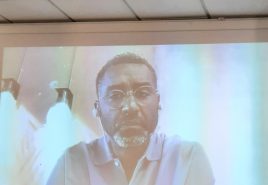 He is considered one of Africa’s most influential figures. He is known for his cartoons of the ‘Arab Spring’. Cartoonist Khalid Albaih, 42, is a Sudanese refugee, reporting live from Norway. He created the show and the hashtag #Khartoon to raise awareness on the ongoing violence in his country. His father was a diplomat who fell into the crosshairs of General Al-Bashir. “Europe tried to support civilians on the political plane but unfortunately they also legitimised the military and paramilitaries of the Rapid Support Forces,” the cartoonist noted. Hemeti received EU funds for monitoring the flow of migrants. EU citizens should now be informed that the number of refugees is increasing and that the crisis is bound to affect their countries.
He is considered one of Africa’s most influential figures. He is known for his cartoons of the ‘Arab Spring’. Cartoonist Khalid Albaih, 42, is a Sudanese refugee, reporting live from Norway. He created the show and the hashtag #Khartoon to raise awareness on the ongoing violence in his country. His father was a diplomat who fell into the crosshairs of General Al-Bashir. “Europe tried to support civilians on the political plane but unfortunately they also legitimised the military and paramilitaries of the Rapid Support Forces,” the cartoonist noted. Hemeti received EU funds for monitoring the flow of migrants. EU citizens should now be informed that the number of refugees is increasing and that the crisis is bound to affect their countries.
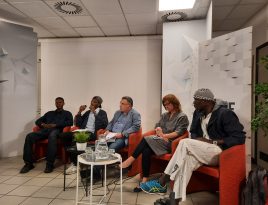 On a population of 55 million, 19 million persons are currently food insecure, a record figure for Sudan. The data was shared by Emanuela Cutelli, World Food Programme coordinator. ” One third of Sudan’s population was already food insecure before the conflict, and now an additional two and a half million people are food insecure. It’s a catastrophic situation. The UN agency has so far distributed food aid to 830,000 people and hopes to “reach one million in the coming days”. Writer and philosopher Filomeno Lopes, however, urges Africans to “stop feeling sorry for themselves and be more insistent with our institutions, especially the African Union. To continue asking for help that does not come is to continue hurting ourselves”. According to Report Difesa journalist Luca Tatarelli, an expert on geopolitical and military affairs, “what we are seeing in Sudan is another proxy war. Russia and China are now intervening on the African front to distract NATO from Ukraine. Africa is strategic for a strategic control of the resources needed for future technology.”
On a population of 55 million, 19 million persons are currently food insecure, a record figure for Sudan. The data was shared by Emanuela Cutelli, World Food Programme coordinator. ” One third of Sudan’s population was already food insecure before the conflict, and now an additional two and a half million people are food insecure. It’s a catastrophic situation. The UN agency has so far distributed food aid to 830,000 people and hopes to “reach one million in the coming days”. Writer and philosopher Filomeno Lopes, however, urges Africans to “stop feeling sorry for themselves and be more insistent with our institutions, especially the African Union. To continue asking for help that does not come is to continue hurting ourselves”. According to Report Difesa journalist Luca Tatarelli, an expert on geopolitical and military affairs, “what we are seeing in Sudan is another proxy war. Russia and China are now intervening on the African front to distract NATO from Ukraine. Africa is strategic for a strategic control of the resources needed for future technology.”












